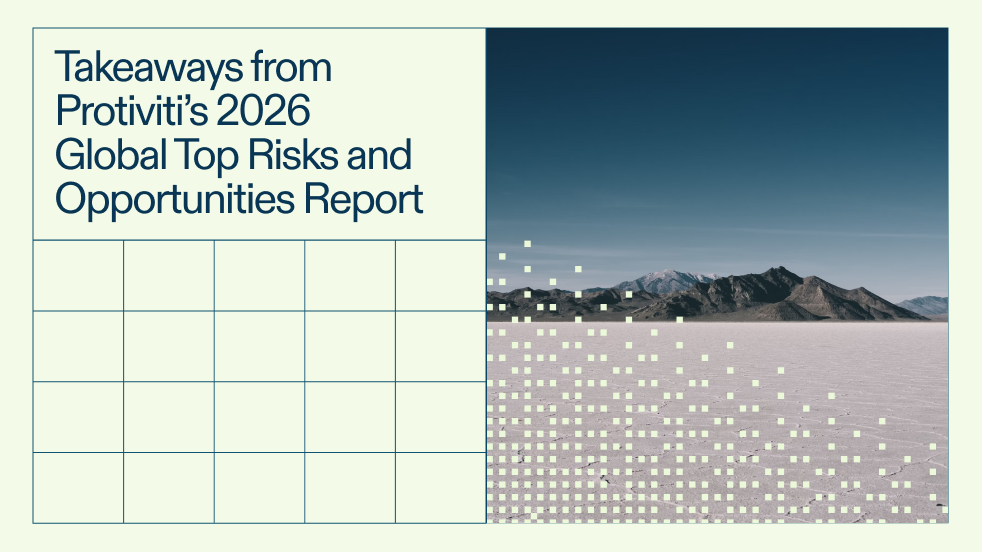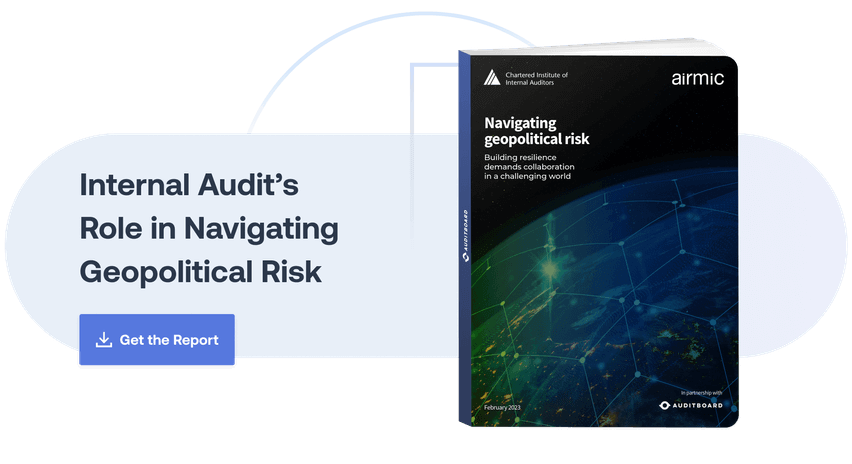
February 27, 2023 • 7 min read
7 Takeaways From the Navigating Geopolitical Risk Report
Geopolitics is used broadly to refer to international politics – and sometimes even to aspects of domestic politics, especially when policy impacts relations between countries.
We are at an inflection point in geopolitics. The spectre of war has returned to Europe. Decoupling between the economies of the US and China, the world’s two largest economic blocs, is reversing globalisation as we have known it. The International Monetary Fund’s (IMF) World Uncertainty Index readings have hit elevated levels in recent times.
A new report by the Chartered Institute of Internal Auditors (CIIA), Association of Insurance and Risk Managers in Industry and Commerce (Airmic), and AuditBoard demonstrates why risk and internal audit professionals need to relook at the way they collaborate, as their organisations build resilience amid the maelstrom of geopolitical risks. Elevated uncertainty created by an increase in volatility, complexity and pace of change in today’s geopolitical era calls for new approaches to be adopted.
Read key takeaways below and download the full report, Navigating Geopolitical Risk: Building Resilience Demands Collaboration in a Challenging World, for ideas, approaches, and practical tips to help you support your organisation in navigating geopolitical uncertainty.
1. Be agile in responding to the challenges of ‘once-in-a-generation events’ occurring with regular frequency.
With Russia’s invasion of Ukraine happening on the back of the pandemic, there is the danger of organisations making long lists of all the things that could possibly go wrong in geopolitics. But geopolitics is not a game of predicting the future. Some political observers have been chided for advising organisations that Russia had no rationale to invade Ukraine, but geopolitics is predicated on human behaviour – of leaders and citizens – which does not always go to script. All of this calls for organisations to be agile in responding to geopolitical crises and to be in a permanent state of readiness that recognises the nature of the crises we find ourselves in today.
2. Scenario planning and horizon scanning are the keys to preparing for geopolitical risk.
Organisations must resist the temptation to be events-led and retain agility for when crises may strike. But agility is not a licence for them to improvise their response on the fly. They have to constantly challenge, stress test and update all of their baseline assumptions about the likelihood and impact of the risks they face. Meanwhile, horizon scanning should focus on assessing the velocity, impacts, and likelihood of major trends. A key output from this process would be a shortlist of risk scenarios captured in an emerging risk register, which is used to stress test the business planning cycle and development of future strategy.
3. Stereotypical profiles of risk and internal audit professionals need to be reviewed to ensure they meet future needs.
Risk management and internal audit have distinct responsibilities, but they must work together and at the same pace. Synchronicity is critical to the successful use of the Three Lines Model as adopted by the Institute of Internal Auditors (IIA), to achieve effective alignment, communication, coordination, and collaboration. Professional education needs to balance soft and technical skills. The talent pool for the professions needs to be adequate for the needs of the future.
4. Take a long-term view of geopolitics.
‘Long-term’ may be five years in certain Financial Reporting Council (FRC) guidance, or it may be 30 years in energy and infrastructure sectors. Nevertheless, organisations need to bear in the mind the geopolitically-related risks relevant to them and their supply chains, and not only in the short to medium term – reliable countries may no longer be friendly ones further down the road.
5. Stay true to the organisation’s purpose.
After Russia’s invasion of Ukraine, Western organisations were forced to make decisions as to whether to withdraw their operations from Russia, often after decades of investment there. It is imperative for organisations to be clear about their purpose, risk appetite, and strategy, while also being agile in their responses to crises.
6. Geopolitics is not just all about downside risk.
Organisations must have the agility to seize upside opportunity to cushion the impact of geopolitical crises, and enhance upside growth potential where possible.
7. Risk and internal audit need to operate as strategic enablers.
A key role will be providing executive decision-makers in their organisations with information that is appropriate and timely as they make difficult decisions in a challenging environment.
The Collaboration Imperative for Internal Audit and Risk Professionals
Geopolitical risk is becoming far higher in profile on the risk radar of most businesses and is a board agenda item – and according to our research conducted in support of this report, one which demands a collaborative response from risk and internal audit professionals.
It is harder for businesses to plan for disruption. Businesses are monitoring and navigating the short-term risk outlook, scenario planning for the longer view, but keeping an eye on strategic opportunities that can emerge from volatility. Building resilience is imperative. Businesses need to be prepared to deal with significant disruption caused by political incidents.
Download the full report, Navigating Geopolitical Risk: Building Resilience Demands Collaboration in a Challenging World, for more ideas, approaches, and practical tips to help you support your organisation in navigating geopolitical uncertainty.
You may also like to read


Latest data on AI adoption reinforces need for internal auditors’ “superpowers”

5 internal audit resolutions for 2026

Audit reporting best practices: Guide for audit leaders

Latest data on AI adoption reinforces need for internal auditors’ “superpowers”

5 internal audit resolutions for 2026
Discover why industry leaders choose AuditBoard
SCHEDULE A DEMO




